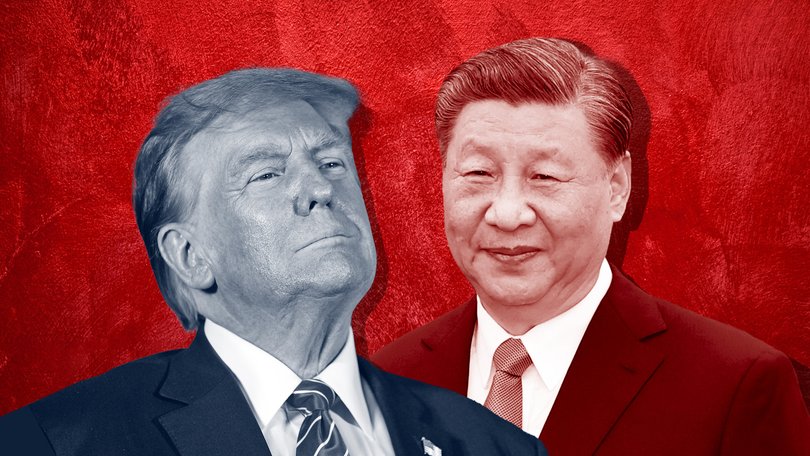THE NEW YORK TIMES: Beyond trade war, China’s Xi will look to press Donald Trump on Taiwan
THE NEW YORK TIMES: Donald Trump has said that he wants to focus on trade when he meets Xi Jinping in South Korea, even if the Chinese leader presses him on Taiwan.

When China’s leader, Xi Jinping, sits down with President Donald Trump to address their worsening trade tensions, he will also be pursuing another, longer goal: persuading the American president to soften US support for Taiwan.
Trump has said that he wants to focus on trade when he meets Xi in South Korea, even if the Chinese leader presses him on Taiwan, the democratically governed island roughly 100 miles off China’s coast that Beijing claims as its own.
But the diplomatic maneuvering raises a crucial question: how negotiable is American support for Taiwan, especially given Trump’s sometimes dismissive comments about the island? Chinese officials, analysts said, may seek at this and other meetings to draw Trump out on the issue, to have him clarify his position on Taiwan.
Sign up to The Nightly's newsletters.
Get the first look at the digital newspaper, curated daily stories and breaking headlines delivered to your inbox.
By continuing you agree to our Terms and Privacy Policy.Xi probably wants Trump to state that the United States does not support independence for Taiwan, experts said. Saying that would echo what previous US administrations have said, but a clear statement of it by the US president would be welcomed by Beijing, which has for years accused Washington of, in effect, encouraging Taiwan toward independence. This year, the State Department altered a webpage about Taiwan, removing the phrase “we do not support Taiwan independence,” drawing loud complaints from China.
Taiwan relies on American political and military support, so any language from an American president that is seen as diluting Washington’s support for the island could be used by Beijing to try to set the terms for future discussions. If Trump said that the United States “opposes” Taiwan independence, that would be a bigger win for Beijing.
“Once something is said that helps China’s case, it treats that as the new baseline,” said David Sacks, a fellow for Asia studies at the Council on Foreign Relations in New York, who co-wrote an assessment of how Taiwan may figure in talks between Trump and Xi. “They would try to lock in all successors to that precedent.”
For China, the meeting in South Korea on Thursday appears to lay the groundwork for a full summit between the leaders. Trump has said that he intends to travel to China early next year and that he also wants to host Xi in the United States.
“The Chinese probably do see a sequencing: that they want some kind of ceasefire in the trade war and a de-escalation to start, and then they want to open up the larger geostrategic issues,” Sacks said. “I think Taiwan is the centre of that.”
Since Trump took office this year, his administration has scaled back some dealings with Taiwan, the kinds of exchanges to which China vehemently objects. Washington refused to let Taiwan’s president, Lai Ching-te, make a stopover visit in New York. It downgraded talks between Taiwanese and US defence officials and moved the meeting from Washington to Alaska, the Financial Times reported.
China thinks US policy on Taiwan will evolve in its favour, said Amanda Hsiao, a director for China at the Eurasia Group. “What they see is the potential for U.S. commitments to Taiwan to weaken over time because of the shift in balance of power that they believe increasingly advantages China.”
Trump has complained that Taiwan spends too little on its military and unfairly dominates semiconductor production. (Taiwan has already promised to spend more than 3 per cent of its economic output on defence by next year; Trump and his officials have said that number should reach 5 per cent or even 10 per cent.)
Trump has swung between questioning Taiwan’s ability to withstand threats from China and boasting about US power to deter Beijing. Asked last week of a possible Chinese invasion of Taiwan, Trump again emphasised US military dominance.
“The United States is the strongest military power in the world by far, it’s not even close,” Trump said during a news conference. “Nobody’s going to mess with that.”
Still, Trump may calculate that adopting some language similar to President Bill Clinton’s during a visit to China in 1998 — that the United States does not support independence for Taiwan — could make Beijing more amenable in trade negotiations, such as over its new controls on rare earth exports.
“For Xi, it’s critically important that Donald Trump at least communicates that he understands the Chinese position” on Taiwan, said Rorry Daniels, the managing director of Asia Society Policy Institute. “He needs to understand that Donald Trump is not going to surprise him on Taiwan.”
Taiwan’s foreign minister, Lin Chia-lung, however, downplayed concerns about what Trump might say about Taiwan when meeting Xi. “We are in close communication with the US side, and their interactions with China won’t harm Taiwan,” Lin told Taiwanese legislators last week.
Secretary of State Marco Rubio dismissed the idea that Trump would make concessions on Taiwan in exchange for “favourable treatment” from China on trade issues. “No one is contemplating that,” Rubio told reporters Saturday while in the Middle East.
This article originally appeared in The New York Times.
© 2025 The New York Times Company
Originally published on The New York Times
